- Home
- Madeleine Roux
Sadie Walker Is Stranded Page 2
Sadie Walker Is Stranded Read online
Page 2
“I said they’re my friends. What’s the problem?”
“Just get the groceries, okay?”
I didn’t feel like arguing with him, not just then, not when poor Shane was probably curled up in the fetal position, convinced that he’d been abandoned again. Shane is my sister Kat’s eight-year-old. Kat and her husband were on a bus when The Outbreak hit downtown. They never made it home and voilà, just like winning a twisted game show, I became a mother to a quiet little nerd with sunshine curls and a gap-toothed, if rare, smile.
Even more people were out and about as I half-ran up 1st Avenue. Looming, burned out storefronts darkened either side of the road; a run-down strip club with greasy windows and sun-bleached posters looked as if a demolition team had gone nuts on its insides. The main market still functioned as a grocer, but for basic things now—blankets and clothing and food and a few real gems, like booksellers and wine dealers. The Outbreak hit us in September. By early November, alcohol and books were at a premium. They still were, but at least now people like Jason and a few others produced new work, new books and comics.
I turned right, going more steeply uphill, away from the waterfront and toward the apartment. Most things change, but some things never did. The Olympic Mountains loomed over the Citadel, rising out of the fog, silent, stoic watchers that, on a daily basis, managed to remind me that enduring was possible. Other things, less majestic things, stayed the same too. Like the crappy all-night grocers in this part of town and the seedy bars. There was nothing to sell there now except sex with pock-marked flesh and the accompanying array of colorful diseases.
My whole body, sensing trouble, sped up. A nasty idea had occurred to me: Carl didn’t have friends, Carl had customers. He dealt mainly in knives, self-defense junk, and he had a knack for finding army surplus all over town. Carl kept the knives elsewhere but the only people I’d ever seen him hang around with were in some way tied to his business. I didn’t like his business, but it brought in extra food, a lot of it, and you just didn’t complain about that sort of thing.
Belltown, now laughingly called Beet-town, housed entire city blocks stripped down and devoted to growing the knobby purple vegetables. It was a smart thing to grow when you had investment bankers and massage therapists tending the gardens; beets are hearty and hard to fuck up. There’s another more alarming reason for the nickname: it’s a rough area and Beet-town sounds a lot like its other specialty, beat downs.
Luckily, even with the dregs of the city up and stumbling out of their doorways, I was safe. People knew Carl in this part of town and so by extension they knew me. Nobody picked a fight with a man specializing in knives and they didn’t bother his girlfriend either. Carl was better than a can of Mace and cheaper than a gun.
A prickly heat began rising out of the back of my scarf. I should’ve just waited to leave the apartment and dropped Shane off with Mrs. Trieu downstairs. She didn’t open her day care until after ten, giving her some time to tend her own expansive garden and do the cooking and washing for the day. Mrs. Trieu charged exorbitant prices, even by post-Outbreak standards, but she was also a crack shot with a Luger and made the best Vietnamese food in ten blocks, so nobody minded. Her spotless record and tasty Pho spoke for her.
Our apartment took up the western half of one block, the eastern half reserved for the gardens. The redbrick façade was in bad shape, slender shadows falling down over the windows and front door from the ragged roof supports jutting out. Ivy had sprung up through the broken sidewalk, covering the front of the apartment with a gangrenous mossy film. Someone had taken an old Buick and turned it into modern art in the intersection, peeling open the roof and nailing lawn ornaments to it. A fat sleek crow perched on the curled car roof. Glossy black wings, slightly iridescent—crows are an illustrator’s best friend; they’re simple to sketch, beautiful and an instant dosage of gravitas to any frame.
Fumbling with the keys, I flung open the front door and raced through the sand-colored empty lobby, down the hall and up the back stairs. Our apartment sat right at the top, around a bare two-by-four doorway, close enough to hear the neighbors troop up and down day and night. The door to our apartment was shut, a good sign, but the queasy feeling in my stomach didn’t ease. Inside it was dark. The pink frills of early morning were just visible out the windows, the sun appearing like a bright red egg yolk behind the clouds.
I dropped my portfolio with a thud on the hardwood floor.
“Shane?”
He never met me at the door. In fact, he was usually hiding somewhere, either behind the mattress or in the kitchen cupboards next to the rice. “Shane? It’s not a joke. Come out here.”
There was a faint tinkling sound, like a distant jingle bell. To the right, the apartment housed a cramped kitchen. Even in the semidarkness I could see a cupboard door inch open. I grabbed the edge and yanked.
“Shane! Oh God, Shane.” I pulled him out of the cupboard, brushing the stray rice off his little shoulder, and gathered him up in my arms. He didn’t protest, which was odd, and put his nose right into the crook of my neck.
“Are they coming back?” he asked in a tiny voice. He was holding his favorite stuffed animal, Pink Bear. It was actually a fluffy pig, but I didn’t have the heart to explain the discrepancy. Pink Bear was the star of many of our illustrated adventures.
“Is who coming back?” I asked. “Carl’s friends?”
“They’re not friends,” he whispered.
I pulled him back, smoothing the blond curls away from his forehead, checking for bruises, signs of injury or abuse. He scrunched up his face and tried to dodge my frantic pawing.
“Did they hurt you?” I asked.
“They’re not friends,” Shane said again.
A flicker of shadow passed over his face and I heard a quick intake of breath from behind us. But there was no time to react, not with a kid in my arms and my heart rate just starting to slow. Something hard and sharp hit the top of my head. I felt Shane slip and my body tip forward and the ground come for me like a swiftly rising tide. But it wasn’t quite enough.
“Hit her again.”
It was Carl saying this. Carl speaking, my Carl, telling someone to knock me out. Shane’s pale blond head flashed in front of me. I turned, stumbling out of the kitchen and pushing past the blurry stranger who had struck me. A black ink spill was falling over my eyes, dripping down like a liquid curtain. But I had enough of my wits to lash out with my arms, reach blindly for my nephew. He screamed. Shane never screamed—he protested from time to time quietly in his meek, middle-aged child manner, but never raised his voice above a thoughtful murmur. There was probably blood on me. Blood would make him scream.
Carl stood in the hallway, his tall, rangy body framed by the open doorway. I fumbled toward him, batting, my legs failing just in time to send me pitching forward. Carl and I tumbled out into the corridor.
“Hit her again. Jesus Christ. Hurry up!”
He slammed into the wall and grunted the air out of his lungs; my fists balled up and pressed against his chest. I grabbed him by the collar of his coat and shook and then pulled. But gravity and my aching head won, and I fell forward again, my weight sending us both toward the stairwell and the wide open arch of two-by-fours. Nothing stopped us. The stairs were suddenly there, plummeting downward, steeper than I remembered. Carl went down first, me on top, and I felt every hard crack against his spine as we toppled and rolled. I was getting nauseous, about to throw up. Everything spun as we finally found the bottom and Carl’s neck, encouraged by my weight, crashed into the baseboard. The last thing I heard was a sound, an unmistakable, biological crunch as vertebrae met wood.
And then nothing and a deep tugging feeling in my chest, like I was being dragged down, like I was drowning.
TWO
The funny thing about being unconscious is that you don’t notice you’re passed out on top of a dead man. I didn’t know that could happen. I couldn’t have guessed. I slept, fitfully, not knowing h
ow long I had been out. In the twilight sleep of pain, I heard words, terrible words that only began to make sense as I came slowly back to my senses. People came and went. Maybe they thought I was dead too. A pair of big, long-lashed green eyes stared down at me. Eyes I recognized, friendly eyes. Andrea.
“You’re up,” she said.
I was laid out flat on my back, the pitted plaster ceiling with its familiar whorls and patterns overhead. Sitting on the mattress beside me, Andrea pushed a glass of water and a little blue pill into my hands. She must have moved me back up to the apartment, but I wasn’t sure how. She’s about my same size, petite and slight, one hundred and ten pounds soaking wet. In the back of my mind I wondered if Carl was still crumpled at the bottom of the stairs. She pointed at the pill.
“Take that. You’ll feel better.”
“Shane!” I wailed. “Is he okay?”
I knew he wasn’t but I had to ask anyway. He was gone. I knew it, felt it and wondered if maybe some weak vestige of motherhood had actually begun to take root in me. That was a warm and fuzzy thought for another time. Andrea put her hand on my shoulder and squeezed.
“He’s gone,” she said quietly. “How’s your head?”
“It hurts … it doesn’t matter. He’s gone. I have to find him.”
I tried to sit up but the rush of blood and feeling made me dizzy and I collapsed back down. Andrea reached over and pried my lips apart, shoving the blue pill between my teeth.
“Swallow,” she commanded, “you’ll feel better. There’s not much time.”
“What are you talking about?”
With everything hurting, especially my head, Shane’s loss seemed far away—blissfully distant. Eventually I would feel it clearly but right now the haziness was more than welcome to stay. She pushed at my shoulders, trying to help me into a sitting position. There was an uncharacteristic urgency in her movements.
“Up,” she said. “We have to get you on your feet.”
“I can’t. My head, it’s … Am I okay?”
“Just a bad bruise,” she replied, pressing her fingers tenderly over the wound. I winced. “There’s a cut, too, but not deep. You’ve been asleep for a day.” Fidgeting, she glanced at the windows and then asked, “Did you kill Carl?”
“No … I guess so,” I said, trying to remember. “I pushed him and we fell down the stairs.”
“So that’s a yes, then?”
I nodded. Andrea shrugged and popped a blue pill of her own. I had known her before The Outbreak, when she was in marketing, but now everyone in a ten-block radius knew her too. Chinese, Japanese, Russian, American—they called her simply Lady Pharma, because she was more knowledgeable and better stocked than any of the functioning ration pharmacies. Pain killers, antidepressants and hallucinogens were her specialty—house calls only—but she could find virtually anything. Sometimes I was sure my surviving The Outbreak was pure luck, a fluke, but Andrea was resourceful; she didn’t simply survive, she thrived.
“We have to get going,” she said. Her lips pursed with determination, she began gathering up her things, shoving orange pill bottles into a bottomless messenger bag. Outside a fire engine screamed by. Andrea pulled on a hat, a brown knit thing shaped like the best part of a muffin.
“Shane,” I said, sitting up with a grunt. “I have to find him.”
“You won’t,” Andrea replied. “Whoever took him will be long gone.” That was Andrea—sensible, reasonable, and levelheaded even when the sky was falling. “I don’t think your little tumble with Carl put a hitch in their step. They’ll be out of the city by now. And pardon my fucking French, but the shit is really about to hit the fan.”
“Did you see them?” I asked.
“No, but it takes more than one person to wrangle a little kid.”
“Not Shane,” I said. Then quieter, “Not Shane. I’m going after him.”
Andrea shrugged and leaned forward, her dark ponytail swinging as she yanked the curtains back. I gazed over her shoulder at the view down to the waterfront. I gasped. Luckily I was already sitting down. Déjà vu that potent could knock you flat on your ass. There was the city sloping down to the harbor and all of it alive with columns of smoke and fire, a picture that might’ve been painted straight from my memory. The Outbreak. I shivered and covered my mouth, certain the retching would be soon to follow.
“How?”
“I’ll explain on the way out,” Andrea said, standing. She ushered me to my feet, strapping the enormous messenger bag across her shoulder. How a person of her size managed to drag that thing around the city on foot was unimaginable. For her trouble, she had a gorgeous pair of leather all-weather boots and she could afford the kind of food Shane and I only dreamed of. Sometimes she shared. She always treated us well.
Us. Shane. I had to find him.
Andrea went to the shallow walk-in closet and pulled open the accordion-style doors. With a sharp eye she found the heaviest coats and sweaters I owned and tossed them into a garbage bag. Standing was difficult, but I managed it with a wincing sigh. There was more than just the painful wound on my head. The tumble down the stairs with Carl had left me as tender and soft as a bruised pear.
The room spun as I gained my feet and the reality of Shane’s situation crashed down with sickening force. Kidnappings were not unheard of. Most things change, but some things never did, like humans just having to fuck up a damn decent thing. So even when the city was “stabilized” and most people could eat and sleep safely, there were those, like the Repops, who had to tamper and tinker and have things their way.
These people didn’t have a name but their shadowy presence lingered over children, like a boogey man or witch woman from a story your grandmother told. Thousands of newly childless parents meant there was a booming black market for children, especially cute, smart children like Shane. There was no trail of crumbs through the forest, no promise of candy, just coldhearted thieves dealing in babies. If a loon spotted a child that reminded them of their own, the next week they might pay to have that very same kid for themselves. A replacement, a flesh and blood Barbie doll. This wasn’t supposed to happen to us—having Carl around was supposed to prevent a kidnapping, not guarantee one.
Someone had paid dearly for this kidnapping and it was almost a relief to think of the price Carl himself had paid. Almost a relief. Relief didn’t bring Shane back, nor did it change the fact that I had screwed up, royally screwed up and let down my sister, wherever she may be.
“Shane will be safe,” Andrea said, reading my mind and my crestfallen face. “You don’t go through the considerable trouble of kidnapping a kid to make his life miserable. He’s probably safer than we are, so let’s get a move on.”
“How?” I asked again, still stunned. Andrea tossed a coat over my shoulders. She had stripped me down to a long-sleeve T and thermal underwear when she moved me to the bed. Now it was time to get dressed, time to care. Andrea knelt and helped me pull on a pair of jeans and then an oversized wool sweater. She tossed the garbage bag full of clothes into my arms and made for the door. Her boots crunched. My portfolio. Months of work. My drawings.
“Stop,” I said, blindly reaching to gather up the sketches. I stuffed them into the torn folder and clutched it to my chest.
“Just the basics,” she said, clearly disapproving. “Ya know—food? Clothing? Booze?”
“I can’t leave them.”
“Fine. Jesus.”
Fussing like a mother hen, she shooed me out the door and down the hall, pointedly away from the back staircase and—logically—Carl. As if seeing his dead body would bother me. The smell might, but the rage was still a big, ugly knot in my chest and the thought of Carl rotting in a shitty apartment stairwell made me feel absolutely nothing.
I wasn’t prepared for the panic outside. The streets were full, crowded with shoving, frightened strangers. I kept close to Andrea, following her dark ponytail through the turmoil in the streets. The drawings kept slipping out of the folder and so fi
nally, frustrated, I pushed them into the garbage bag of clothing. Judging from the smell, Andrea had thrown some dried fish in there too.
Another fire engine shrieked by, red lights flashing like blood-soaked flashbulbs.
“The Rabbits,” Andrea said by way of explanation. I pulled up close to hear her. Even weighted down with her pill pack she moved at an amazing clip. “They finally had enough. They broke through the Queen Anne barrier with a dump truck. Barrier’s thin up in those parts,” she said, barreling over a man twice her size. “The undead could smell them so they were congregated outside—waiting, I guess. You remember last time.” I did. “Just takes one inside the city and boom, there goes your stabilization.”
There was that word again. I was really beginning to hate it.
“Not so easy to flee this time,” Andrea went on. “With the barriers up, everyone is trapped. It’s a goddamn buffet.”
That put a bounce in my step. In this case, being small had its advantages. We sliced through the panicking crowd quickly, squeezing into spaces bigger people couldn’t manage. Nobody seemed to have any destination in mind, just milling and screaming. A few groups peeled off, heading toward the nearest bus stop. Others fled south, toward the Citadel gate. I realized with a jolt that we most definitely had a destination in mind—Andrea had a destination in mind; she was leading me down to the waterfront.
Water … Boats … Suddenly that bounce in my step was gone. Andrea was Portuguese. Her whole family was Portuguese and lifelong mariners. She was full of amusing stories about their rollicking maritime adventures, but those tales always had the comforting hallmark of fiction. But it was in their blood, Andrea said so herself whenever we ate fish, which was often, and so her intentions were suddenly, horribly, as clear as a funeral bell.
“No,” I said, shaking my head. “I won’t get on a boat, I won’t. It’s suicide.”
Andrea grabbed me by the scruff of my sweater and hauled me forward, apparently unmoved by my protests.

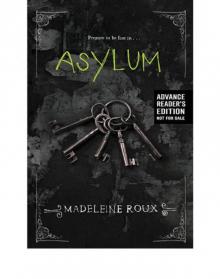 Asylum
Asylum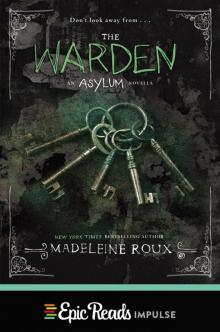 The Warden
The Warden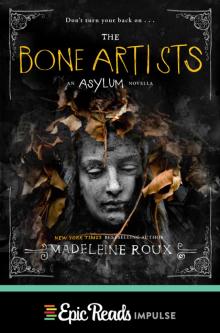 The Bone Artists
The Bone Artists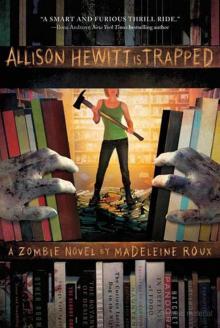 Allison Hewitt Is Trapped
Allison Hewitt Is Trapped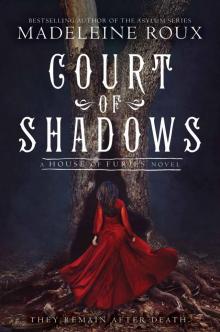 Court of Shadows
Court of Shadows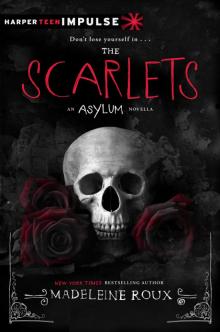 The Scarlets
The Scarlets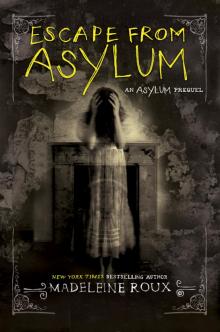 Escape From Asylum
Escape From Asylum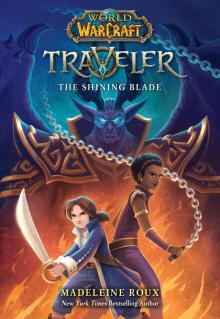 The Shining Blade
The Shining Blade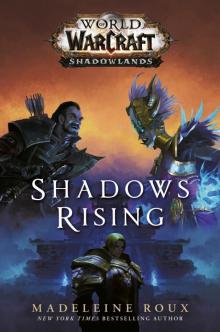 Shadows Rising (World of Warcraft: Shadowlands)
Shadows Rising (World of Warcraft: Shadowlands)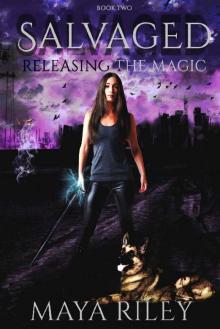 Salvaged
Salvaged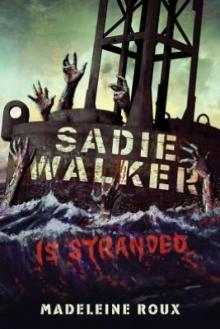 Sadie Walker Is Stranded
Sadie Walker Is Stranded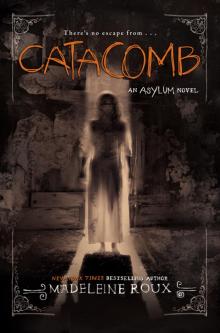 Catacomb
Catacomb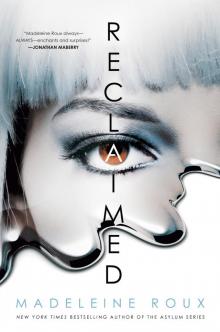 Reclaimed
Reclaimed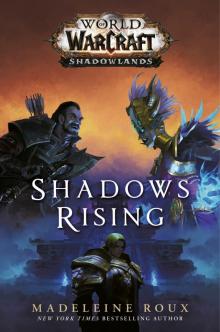 Shadows Rising (World of Warcraft
Shadows Rising (World of Warcraft Tomb of Ancients
Tomb of Ancients